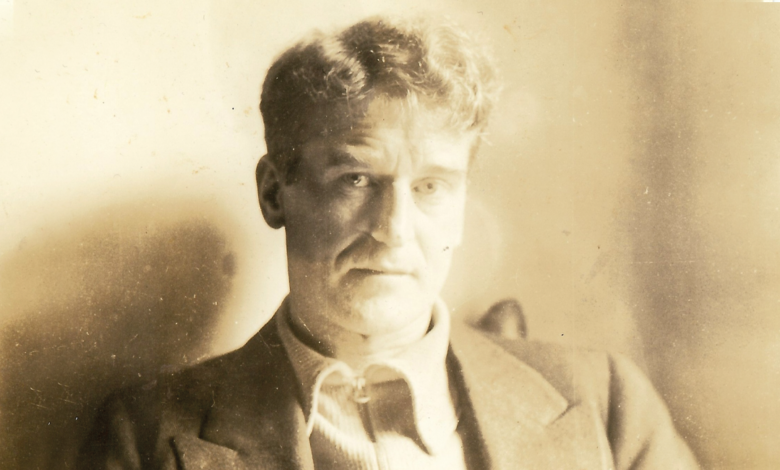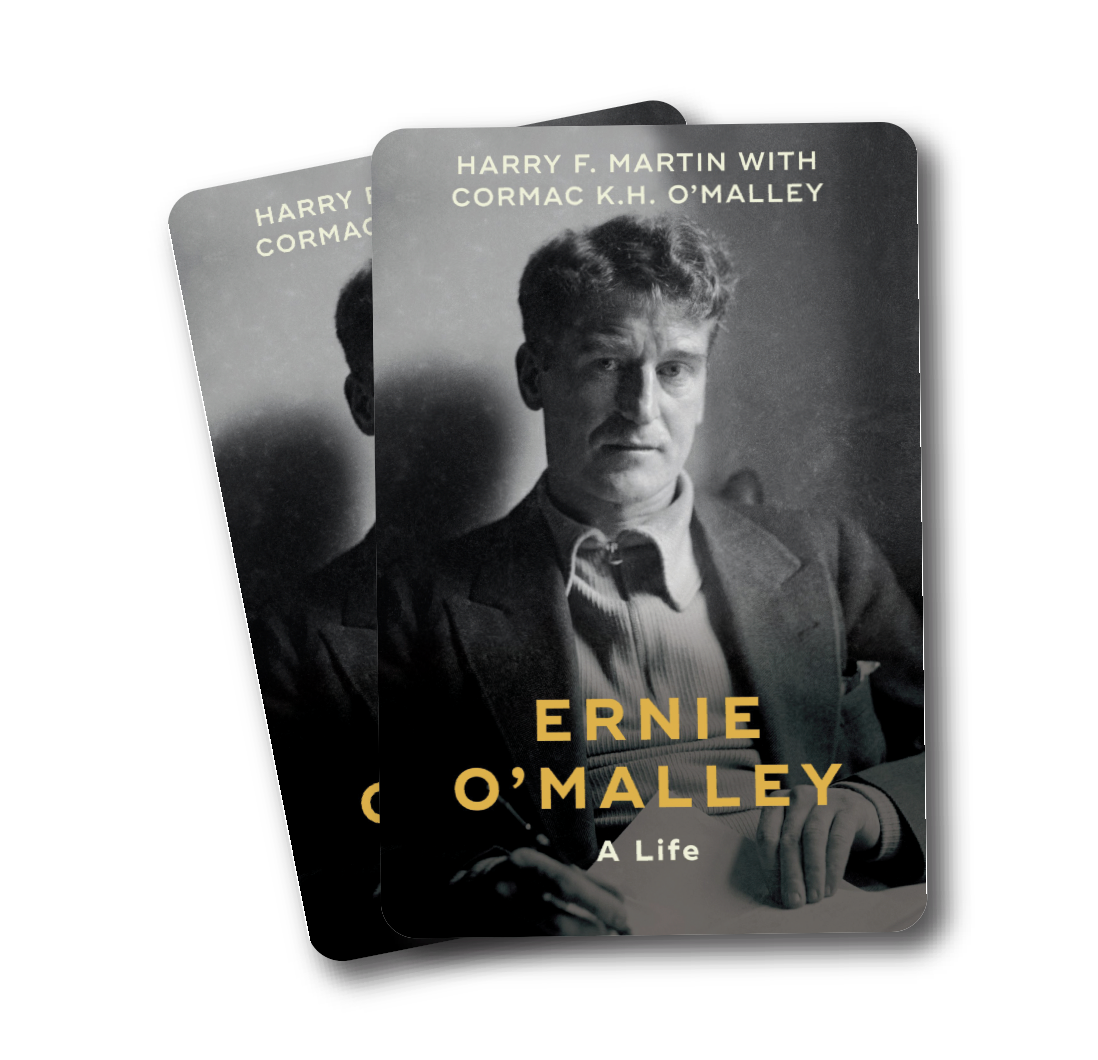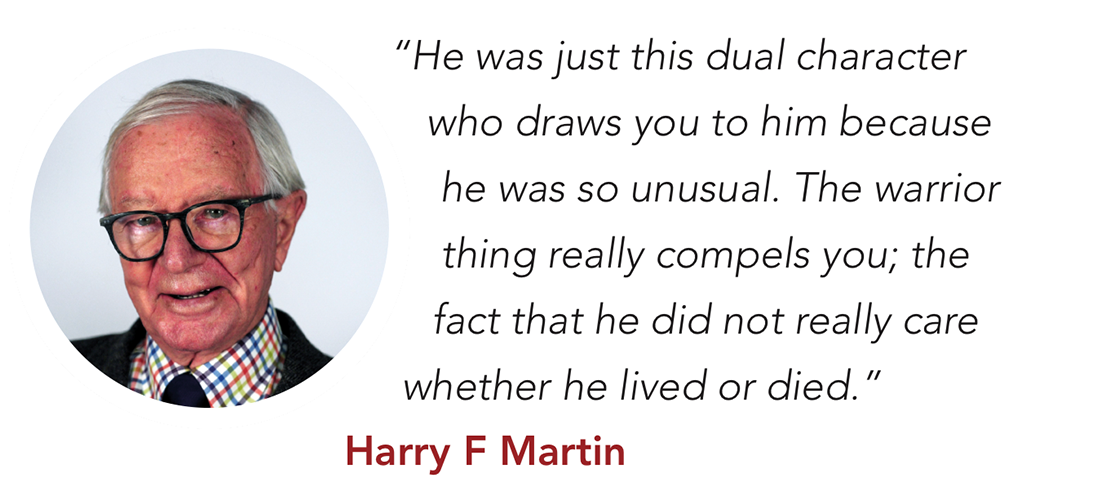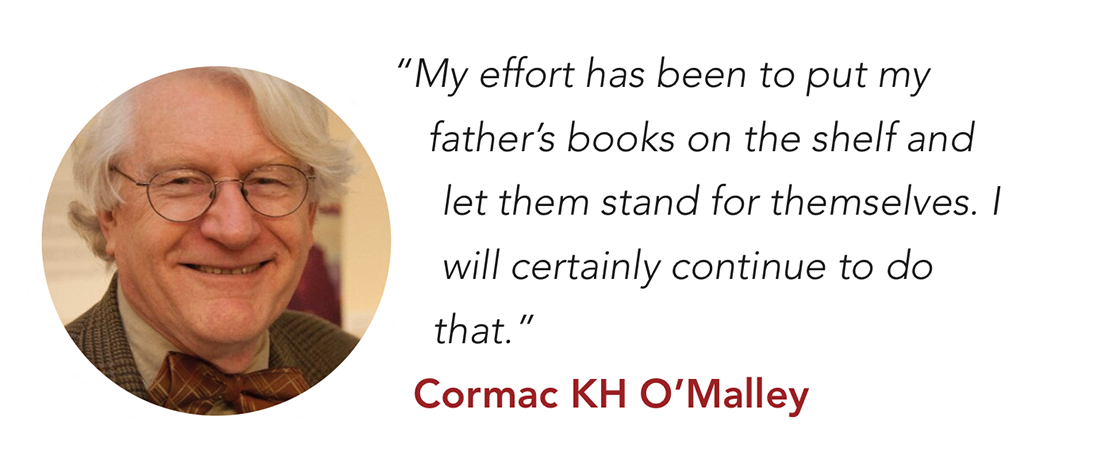Ernie O’Malley: His life according to Harry F Martin and Cormac KH O’Malley

Published in late 2021, Ernie O’Malley: A Life seeks to distil the life story of one of the most prominent figures of the Irish revolutionary period, and, later, a much-admired writer. Ciarán Galway sits down with co-authors Harry F Martin and Cormac KH O’Malley – Ernie O’Malley’s son – to discuss the mercurial man.
A native of Castlebar, County Mayo, Ernie O’Malley pursued medical studies in UCD before abandoning both his studies and his conservative and Anglocentric family home. Immersed in revolutionary fervour following the Easter Rising, he rapidly ascended the ranks of the IRA, ultimately becoming a commandant-general at the age of 23. Having survived both the War of Independence and the Civil War, during which time he endured captivity, torture, and escape, as well as severe battle wounds and a 41-day hunger strike, the second half of his life was no less interesting.
Described variously as an ‘intellectual’ and a ‘renaissance man’, he rejected the post-revolution consensus of the Irish Free State, instead embarking on travels across Europe, America, and Mexico, traversing artistic communities in Provincetown, Greenwich Village, Carmel, Taos, Santa Fe, Mexico City, Woodstock, and Yaddo.
Along the way, he became a contemporary of figures such as Edward Weston, Hart Crane, Katherine Ann Porter, Alfred Stieglitz, Paul Strand, Jack B Yeats, Samuel Beckett, and John Ford, among others. At the same time, he undertook a tumultuous marriage with American heiress-sculptor Helen Hooker, the mother of his three children, Cathal, Etain, and Cormac.
A respected writer, at the time of his death aged 59, much of O’Malley’s work was left unpublished. Reflecting on his most renowned account, On Another Man’s Wound, John McGahern wrote: “[It is] one classic work to have emerged directly from the violence that led to independence.”

Ciarán Galway (CG): Why did you feel compelled to write a biography of Ernie O’Malley?
Harry F Martin (HFM): What drew me to him was the incredible courage that he had, and the stamina to go through being wounded, tortured, etcetera, and never giving up. And that same drive, which took him through an unbelievably difficult warring period, including the tragic Civil War, and when he came out and there was nothing in Ireland for him, and nobody wanted these rebel kids anymore. He did not give up. He went on to have an incredibly interesting career as a writer, a friend of intellectuals, and a sponsor of the arts. He was just this dual character who draws you to him because he was so unusual. The warrior thing really compels you; the fact that he did not really care whether he lived or died.
Cormac O’Malley (CO’M): Harry drove the story with his passion for the character and I filled in on the factual side. Father had already written and between his two books on the War of Independence [On Another Man’s Wound] and the Civil War [The Singing Flame] – and the books that I had published of his letters, both in the Civil War and the rest of his life – we had a basic framework. What I was able to provide in between that was material that is not included in the letters, so that Harry got a better feeling for the characters.
CG: How can you distil a multifaceted character like Ernie O’Malley into a single book?
HFM: You do that with great effort. I had to keep getting rid of material all the time when I finally realised that both my co-author and my wife were right most of the time and all these extra pages that I had on Ernie had to come out. Then the real writing and learning begins, where you can say something concisely and you never tell the reader that he was a great guy, you let the reader find out. The most excruciating part of the writing was boiling down into the briefest possible explanation, what this terribly complex guy was like in the last half of his life.
CG: How do you define Ernie O’Malley’s Irish republicanism?
CO’M: He was initially taken up with the whole Sinn Féin cause. Once he joined that, there was a commitment throughout to the Sinn Féin principles. You can see over the initiation of the Truce, where he smelled something was going wrong, and leading that up into the debate on the Treaty when he offered his resignation to [Richard] Mulcahy.
There was again, a Sinn Féin consistency at that period as well as with the no compromise over the Treaty and the Four Courts. This goes through the rest of his life. He is a Sinn Féiner and will not join Fianna Fáil. He accepts the hospitality of [Éamon] de Valera to go to America because it is an excuse to get out of Ireland.
When he is asked, in January 1929, by Frank Aiken, to speak on behalf of de Valera – who had just been arrested – father said: ‘No, I am here on a mission to recommend and raise funds for the Irish Press.’ Basically, he was saying that he will not speak on behalf of a Fianna Fáiler. At the end of his life, the irony is that de Valera is able to capture the O’Malley mantle by offering him a state funeral. In that way, O’Malley gets tucked into de Valera’s heritage.
CG: To what extent did O’Malley develop class consciousness?
CO’M: He was empathetic to what was happening in the world. He saw different people from different types of life, whether they be the Plunketts, who were well off, or the Lynchs or the Kilroys, who were not well off. He was dealing with people from different backgrounds.
Now, he had an intellectual superiority in a certain sense. He bemoans the fact that he cannot hear music, or talk to anyone about art. Does that interfere with his mission? No. He just happens to remark on it. He said that he would love to hear music. Why would he go to the National Gallery on a Thursday night when it is open after 17:00? Because that is his thing. He loves art and he bemoans that there is no one else in there, and certainly not from the revolution.
CG: What explains Ernie O’Malley’s rapid ascent through the ranks of the IRA?
HFM: He was an intellectual and it came to the attention of [Michael] Collins and [Richard] Mulcahy that he had somehow educated himself. He never had any real military training aside from reading the British books. Then, on the other hand, he had been all over Ireland as an organiser, so he had experience of a wide variety of men. Then he had this particular charisma. This combination of qualities did not exist in the other men. They had not been organisers all over the place, and they certainly did not have the intellectual discipline to understand how to organise and all the aspects that go into putting a combat unit together. Then he had this charisma, and they took a chance on him, and they were right.
CO’M: In addition to that, unlike the other leaders, who were in competition, you have to recall that Ernie O’Malley had worked directly under Collins. After each time he went out on a mission, he would return to St Enda’s School, and he would be doing the paperwork and they would be having their conversations. There are a couple of instances in On Another Man’s Wound where Collins asks my father’s opinion on certain people. Father actually gives a very frank opinion, but never totally honest in the sense that he does not tear down a character. So, Collins perceives that O’Malley has the capacity to observe, the capacity to act, and the capacity to be a leader.
CG: While he was a born combat leader, to what extent were his limitations as a headquarters strategist later exposed?
HFM: [Seán] Lemass said, as a combat leader, O’Malley was wonderful but as a strategic leader, on a higher level, he was a failure. It was clear that the republicans had lost the Civil War and O’Malley adamantly refused to recognise it, even though he was sending military dispatches – that Cormac has put together in No Surrender Here – to [Liam] Lynch, and they can barely get to him because he has no good communications, saying the so-and-so division up here is all shattered, they have captured everybody. Yet he still retained that command, and he was kidding himself. He was magnificent, really, as an irregular guerrilla combat leader, but he had had no combat experience – neither had Lynch – in larger operational, set-piece battles. And he was terrible in that because his passion as a young republican did not allow him to see that he was in a totally hopeless situation. That was his greatest weakness.
CG: Was his single mindedness at the time of the Anglo-Irish Treaty a weakness?
HFM: Yes. There was one other thing that drove every one of those young generals and that was that the Free State was exercising some of the same terrible cruelties that the British had. And as they saw their comrades imprisoned, killed in gaol, blown up in [County] Kerry. They reacted. This emotion that a terrible injustice was being done by their former comrades against their men made it even more difficult for them to see reality.
CO’M: I think that is right; there was a blindness. Even if they had have met with Collins in June 1921, would they have accepted a compromise leading up to a truce? They might have.
So, there was a narrowmindedness in terms of their objective, early on. When you go down to counties Mayo, Kerry, Cork, or some parts of Tipperary – even today – you will find great support for that original feeling that no compromise was the best position. The fact that it was not really attainable, that six counties had gone, permanently, were never going to be achieved by military force, or political force at the time; they just did not accept that. And the British Empire was not going to give up on an oath of allegiance in some form or other, for a democratic republic to be established. They were blind to those facts. CG: What options faced Ernie O’Malley upon release from Free State captivity in July 1924? Why did he reject politics?
CG: What options faced Ernie O’Malley upon release from Free State captivity in July 1924? Why did he reject politics?
HFM: He had no prospects. He had no money. He really, by that time, had probably figured out that he did not want to be a doctor; he was too inflexible and too purist. He did not want to be a politician. He has no future. He returns to the family home and his father is still angry at him. He is terribly wounded and so he goes to recuperate in Europe and the depth of his stamina is shown but he never gives up on the fact that he is going to be a significant person in the world.
When he is in Europe, he is ‘General O’Malley’. When he is sent to America, he is ‘the General’. The fact that he is a general may give him access to people like [John] Ford, the film director, and [Paul] Strand, the photographer, and all these people. That makes him the intimate of all these creative intellectuals. Hart Crane and Katherine Ann Porter were leading writers of the time – and Hart Crane says of him: ‘I have my most pleasant literary moments with an Irish revolutionary, the most quietly sincere and appreciative person I’ve ever met… Ernest O’Malley by name. And we drink a lot together – look at frescos – and agree.’ He could create intimacy with people in an hour or two and leave such a lasting impression that when he goes to the New York, he is entrée to all the deepest intellectuals.
So, what he does in the second part of his life is recreate himself. He was always a deep intellectual, but the same drive that makes him a great military leader, makes him a great, charismatic intellectual that all the elite of America and Mexico relate to, and that propels him to Ireland.
CO’M: Going back to your question as to what happened to his role in politics in 1924 was that he remained a Sinn Féiner. Though he is in bad health as he gets out of gaol, he attends an IRA Army Council just one month later, in August, and he accepts a position to become a member of the five-man executive committee. As Harry mentioned, he takes off for Europe, but that is for health reasons, not for political reasons. When he comes back in 1925, 1926, and 1927, he is still a member of Sinn Féin at UCD, and he had a little carrying card. So, the real question is when does he ever give up the political ambitions of Sinn Féin? He is a member of the parliament and that expires in 1927. Does he re-run? No. Is he available for re-running? Yes, because he is in Ireland at the time of that election, but he decides not to. So, clearly by 1927 he has come to a decision. The political world had failed Ireland and he did not want to have any part in it..
CG: How do you explain the stark contrast between the revolutionary years and then second half of his life?
HFM: He is not a casual intellectual. During the warring years, he carried these books around. He was a relative expert on Spanish painting. He used Lorenzo de’ Medici as his model. He has this deep, incisive knowledge of painting, literature, philosophy, and history, which he is trying to keep alive as he is an itinerant warrior with no base at all. So, this was not something new for him, it was something that lay nascent there during the warring years. All he had to do was touch a match to it and it lit up again.
Then, the minute he gets a chance, he starts writing these books. If he was not a deep, creative intellectual, how could all these American intellectuals relate to him and accept him immediately, with those natural qualities that he had?

CG: Was it romanticism that endeared American intellectuals to Ernie O’Malley?
HFM: I think it may have been. I think he is a great romantic. Cormac and I never discussed this. I think he is a great romantic.
CO’M: I do not know how to answer that. I can describe what he is like. He believes in himself and what he is capable of doing. He says he finds happiness in the arts. He does not want to become the surgeon that will save lives, he would rather become the art historian or the person who helps preserve Irish culture and gets Irish culture back into the mainstream of Ireland. Now, if you look at the cultural revival movement of the early 20th century, he would have subscribed fully into that. Is that romanticism? That is cultural, whether it is romantic or not. I totally agree with Harry’s characterisation of him, that he was not a ‘bohemian’ in what we think of that as a term. But he was an intellectual who had aspirations for how Irish culture could be changed and how, in fact, over the course of years, during the Free State government and later, during de Valera, that was not achieved. The fact that Ireland is there now, I think Ernie O’Malley would be very happy with the cultural activities in Ireland.
CG: To what extent was Ernie O’Malley’s time spent travelling in the US and forming relationships with intellectuals his golden era? Was he hampered by his relative poverty?
HFM: He was hampered always by his poverty. In New York City he is surrounded by all these rich people, or highly successful intellectuals, like Alfred Stieglitz, the photographer, and the brilliant intellectual James Johnson Sweeney – who becomes the second director of the Solomon R Guggenheim Museum – and he is broke.
The fact that he was the glamorous general who was now an intellectual in the middle of Manhattan led a mutual friend to get Elon and Blanche Hooker, parents of Helen Hooker, to invite him to the Sunday lunches at their mansion in Greenwich, Connecticut, where they were searching for suitors for the daughters. Their youngest daughter, [Blanchette Ferry Hooker], had just married the most eligible bachelor in America, the tall, fit, bright John D Rockefeller III and there was Ernie O’Malley talking to Elon Hooker about how the United States had been so unfair to the American Indians, and there was the tumultuous, independent, beautiful Helen Hooker looking at him, thinking, ‘now, here is the young man who can stand up to my father.’
CG: Through his marriage to Helen Hooker – a woman completely removed from revolutionary Ireland – in London in 1935, to what extent did Ernie O’Malley finally break with Irish republicanism?
CO’M: I think you need to divide republicanism into what the Republic stood for in its original values. I think Irish culture would be one of the pillars upon which he wanted to establish the Irish Republic. He was frustrated because it never came about – the Republic in the first instance and the culture in the second.
He only got married in London because my mother was not a Christian and they could not get married in a religious ceremony in Ireland. Father found out that the Brompton Oratory [or Church of the Immaculate Heart of Mary] allowed a non-Christian to be married outside the altar. So, they went to London to get married, then they returned to Dublin.
He started to build a republic of the mind, namely in culture and ideas, which was not a political republic, with his friends Frank O’Connor, Seán Ó Faoláin, and other people who sat around the table and were fairly intellectual. My mother fitted into that to the extent that she was an artist, knew artistic people, and was a sculptor and photographer. They started to build up a society which was to their liking through the arts, theatre, sculpture, articles to support of the arts, and exhibitions. So, you can see what he had said back in 1929, in the interview in Seattle, that “my soul lies with the arts. In them lies happiness. I hope to be able to restore Ireland’s interest in them”.
When he found an artist whom he could marry that had no affiliation with Ireland, that gave him the security, personally within their marriage, that Irishness was not an element that needed to be considered. And when they come home to Ireland, they are able to concentrate just on the arts, not on the politics.
CG: What are your memories of your father, Cormac?
CO’M: I arrive on the scene in 1942 when the family is living happily in the west in Burrishoole Lodge [Newport, County Mayo]. My parents have developed a self-sustaining farm, following de Valera’s calls under neutrality that Ireland should be self-sustaining. By that time, my mother has received some funds from the death of her father, and she is able to acquire neighbouring lands –building up a 40-acre farm – and able to employ people. They start living a life where this military, artistic character who wanted to do all these great plans, has become a farmer. That creates an inherent resentment because he does not want to be a farmer.
My mother leaves in 1950, and I do not have many memories of either of my parents back in the family household in the 1940s. In the 1950s, it is a one-on-one relationship with my father. He is the man taking care of me.
Our actual period of interaction is somewhat limited but notwithstanding that, it is still very close. When we move up to Dublin, it is the same thing. I come out on the weekends and help to take care of him. I would say we had a loving, warm relationship in which I was social focus. You can see that in his letters in which he writes with great pride of me to his friends that I am doing well in school.
CG: Do you have any memory of your father travelling the country and putting pen to paper?
CO’M: Indeed. When I was out of school, we would go off together – he had a car – and he was not paid to do it. We would sleep under the car with a Mac over ourselves, and that was better for the back than sleeping in somebody’s bad country bed; he also did not what to impose. I have memories of him going off and doing those things. In fact, he wrote two-and-a-half million words, and then he wrote those two-and-a-half-million words in a second version. So, there are five million words of Irish history which have yet to be published in full form, but there will be about 10 volumes and they will be out within a couple of years.
CG: How would you like Ernie O’Malley to be remembered or would you rather publish his work and let it speak for itself?
HFM: I think Ernie died a reasonably happy man, knowing that he had first made a contribution toward freedom in the warring period. But during this second period, and by the time of his death, he realised that he had made an important contribution to Ireland, that he had been a great writer, and I hope he felt content with himself. I believe that he did.
CO’M: I think he was disappointed by his early death and there were many things that he wanted to accomplish. We have correspondence from 1954/55 when he is writing to people and saying that. In a letter to Paul Strand he wrote of his realisation that the people he was talking to were dying and so his primary focus was to try to get them while they were still alive so that Irish history could be written. He never published Irish history in a way that he had envisioned. In that sense, the cause did not meet the expectation.
Over 20 years, I have undertaken to put his name on a shelf. By that I mean, publish the books as I have – or republish and expand them – and publish his letters, and publish his diaries. There are plenty of other diaries on his trips to Spain and New Mexico, which outlines his understanding of the indigenous peoples. He considers Irish culture to be an indigenous culture that had been invaded by British culture and what he wanted to do was to give sustaining integrity to the original culture.
So, my effort has been to put my father’s books on the shelf and let them stand for themselves. I will certainly continue to do that.





